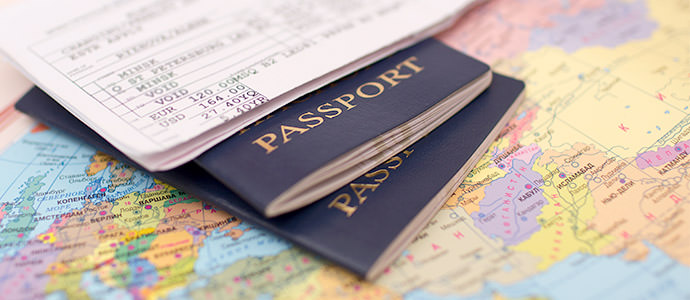14 October, 2022
A Guide on How to Easily Obtain an Authorisation of Residency for Non-EU Citizens in Spain
How to submit a succesful Authorisation of Residency application in Spain
Spain is on the rise – not only regarding the real estate market, but also when it comes to the living qualities. More and more people are moving to Spain. You are one of them, needing help to prepare your stay? Then this blogpost is for you!
The purpose of this blog is to provide a coherent, detailed, and accurate list of every piece of documentation required for non-EU citizens to be granted a successful Authorisation of Residency application in Spain. There is a lot of bureaucracy and red tape that surrounds this process; and it is very common to encounter inconsistencies and false information across different websites and embassy advice about the matter. This blog has been written based on the previous experience of successful Authorisation of Residency applications made by Casamona interns coming from outside the EU; most notably British interns carrying out an internship in Spain post-Brexit. Interns that have submitted Authorisation of Residency applications which have included all the following documentation as stated have been successful in being granted an Authorisation of Residency to remain in Spain for a certain period past the 90-day Schengen area tourist visa allocation. An Authorisation of Residency or a standard student internship visa is obligatory for any internship in Spain lasting longer than 90 days, regardless of whether it is paid or unpaid.

It is important to note the difference between an Authorisation of Residency application and a standard student internship visa application. For most internship placements in Spain that have been approved by a higher educational institute, both an Authorisation of Residency and a standard student internship visa are required. An Authorisation of Residency can be submitted and granted either from the applicant’s domestic country, or once the applicant is in Spain on an initial 90-day Schengen area tourist visa (depending on the internship organisation).
Option 1 – Applying from within your home country
First note you need to take: Student internship visa and Authorisation of Residency are required. The applicant must arrange an appointment at the Spanish embassy in their home country and have both granted before arrival to Spain.
Both a visa and Authorisation of Residency will need to be granted should the applicant decide to carry out the process before coming to Spain from their home country. Should a new intern prepare all the listed documentation early enough before their internship start date, the standard student internship visa and the Authorisation of Residency can be submitted and granted before arrival to Spain (meaning an appointment at the Spanish embassy in the home country will be necessary). If an intern has their Authorisation of Residency or visa granted before arrival to Spain, they are free to start working as soon as they arrive. It is recommended that applicants acquire a visa and Authorisation of Residency before coming to Spain as it avoids any potential issues down the line of accessing important documentation required from an intern’s home country. However, Casamona does have an international lawyer who works closely with the HR department to help submit and guide the process should an intern decide to do it in Spain (potentially at a cost). A standard student internship visa can only be acquired before arriving to Spain as it requires the applicant to have it granted at the Spanish embassy in their home country.
Option 2 – Applying from within Spain
Only Authorisation of Residency required. Once this is granted in Spain, it grants the terms of the visa at the same time. All necessary documentation must be prepared and brought to Spain prior to submission. The interns should initially arrive to Spain on the 90-day tourist visa as previously mentioned.
An Authorisation of Residency application does not necessarily require the applicant to visit the Spanish embassy in their home country beforehand, so long as the applicant decides to submit their application once they have arrived in Spain. Once an Authorisation of Residency submitted from in Spain is granted, it effectively grants the terms of the standard student internship visa at the same time, hence why the visa does not become a further requirement along with the Authorisation of Residency.
If an intern has not had their Authorisation of Residency or visa granted before arrival to Spain, they may enter and remain in Spain on the 90-day Schengen area tourist visa but are strictly not permitted to start work at the internship until Authorisation of Residency confirmation. From the day of arrival, the intern will then have the duration of those 90 days to submit an Authorisation of Residency (so it becomes in process for their internship). Once an Authorisation of Residency is submitted in this time, it then extends the permitted length of stay in Spain to indefinite, up until there is a response from the Spanish authorities about the status of the intern’s application (which typically takes 30 days for a response depending on the region of Spain).

From previous experience, Casamona advises that between finding the internship and starting the internship, a comfortable time frame needed to acquire, process, submit and have all the paperwork granted, would be roughly 3-4 months preparation.
Although much of the same documentation will be required for a visa application as is required for Authorisation of Residency, there may be some differences so this will be crucial to check before starting either process. Once an intern has either a visa, an Authorisation of Residency, or both granted, they will be allowed to remain in Spain for the specific duration of their internship agreement. Interns will then subsequently be provided with an NIE number (Número de Identidad de Extranjero), which permits them to do many things as a resident in Spain, such as sign up for a Spanish bank account (something that may be necessary to receive money for paid internship positions).
Your personal Checklist
Following on from this information, below is a list of all the documentation needed for an Authorisation of Residency application. As previously mentioned, there may be some slight differences between these documents, and the documents needed for the visa application, so please be sure to do appropriate checks.

- A passport style photo with a white background
- A scanned copy of all pages of passport
- A Police criminal history background check – For UK applicants, this will be an ACRO Police form (requires apostille and traduccion jurada to spanish)
- An educational certificate from the applicant’s university or institute – This will need to state the applicant’s course title, start and end dates, current year of study, whether the internship will be a compulsory part of the course or not, and signed by an appropriate university official (also requires apostille and traduccion jurada to spanish)
- Proof of sufficient financial means to support the full duration of the internship – This needs to be provided in the form of minimum 3 months previous bank statements from the arranged start date of the internship, as well as an official bank letter stating the current amount of money in the account and that the money is enough for the duration of the internship (Showing at least €600 minimum monthly coverage). If an intern is going to be financially dependent for the internship, they must also provide the same documents from the bank of the person who will be financially supporting them, along with a letter written by that person themselves stating that they agree to be a guarantor (requires apostille and traduccion jurada to spanish, as well as it needs to be signed and stamped by relevant bank managers)
- An original copy of Birth Certificate (requires apostille and traduccion jurada to spanish) and if an applicant is financially dependant, the birth certificate of their guarantor will also need to be provided as proof
- An ‘Acuerdo de prácticas’ or ‘Convenio de prácticas’ provided by an appropriate university official from the applicant’s appropriate faculty
- A signed rental contract for a permanent address in the appropriate consular district of Spain where the applicant will be living and carrying out the internship
- Valid medical insurance for the full duration of the internship in Spain – This must be with a Spanish insurance company. (Also check any further specific requirements for medical insurance as different universities and educational institutes will demand different things from their alumni. Sometimes, features like repatriation and a minimum coverage amount are requested. Furthermore, for UK applicants, a ehic card will need to be obtained to replace the old ehic cards that were valid before the UK left the EU. These can be obtained for free on the NHS website.)
- A full medical history report (only needed for internships longer than 180 days)
If you’re interested in coming to Casamona, go have a look at our Intern’s Blog







